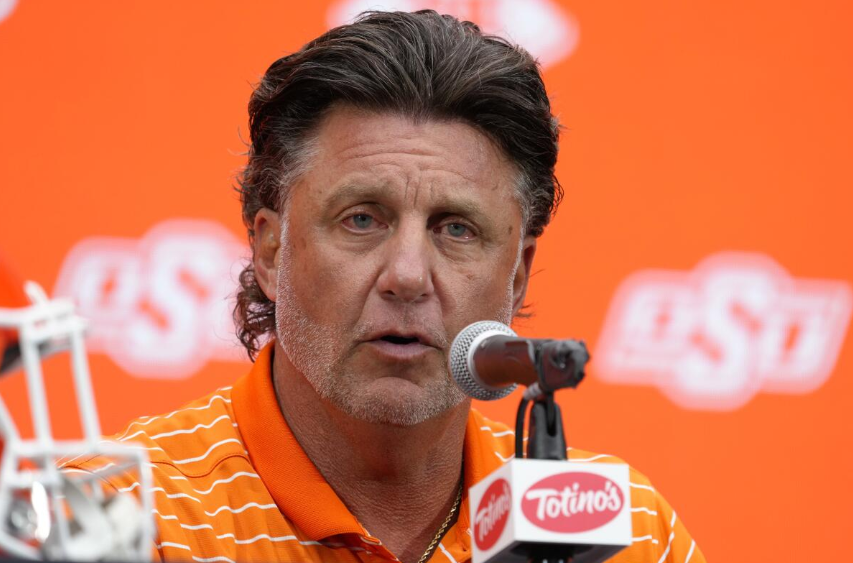
Oklahoma State coach Mike Gundy told players to stop ‘asking for more money’ and NIL deals, focus on football
Oklahoma State head coach Mike Gundy recently made headlines with his blunt remarks to his players about the ongoing discussions surrounding name, image, and likeness (NIL) deals and the transfer portal. As the college football landscape evolves rapidly, with financial negotiations and player movement dominating headlines, Gundy’s stance underscores a return to football-centric priorities for his team. His comments reflect a broader frustration and desire to refocus the team’s efforts solely on the game.
Gundy’s directive was clear: the time for negotiating NIL deals and discussing potential transfers has come to an end. According to a statement he made via The Associated Press, “I told the players there’s no negotiating now. Portal’s over. All negotiation’s history. Now we’re playing football. Just coaching and playing football.” This approach signifies a decisive shift away from the distractions that have increasingly permeated college sports.
The emergence of the NIL era and the transfer portal has transformed the dynamics of college athletics, bringing unprecedented changes to the way players and programs operate. NIL deals, which allow athletes to profit from their personal brand and endorsements, and the transfer portal, which facilitates player movement between programs, have both added layers of complexity to college football. As a result, coaches like Gundy are grappling with a landscape that was vastly different when they began their careers.
For Gundy, the transition from a traditional coaching role to one that involves significant off-field negotiations has been challenging. The new rules and opportunities that have emerged over the past few years require coaches to adapt and respond to an environment where player compensation and mobility are increasingly central issues. With the season opener just around the corner, Gundy’s decision to place a moratorium on NIL and transfer discussions indicates a desire to return to the fundamentals of coaching and competition.
The impact of these new elements on college football cannot be understated. The introduction of NIL deals has created a new revenue stream for athletes, but it has also introduced new pressures and expectations. Coaches are now tasked with managing not just their teams’ performance on the field but also navigating the financial and personal interests of their players. Similarly, the transfer portal has increased player movement, leading to a more fluid roster landscape and requiring coaches to constantly adjust their strategies.
Despite these challenges, Gundy remains focused on what he believes is most important: the game itself. His insistence on setting aside financial and logistical negotiations in favor of focusing on football speaks to a desire for clarity and unity as the season progresses. “The business side of what we do now is, we have to have those conversations with them,” Gundy remarked. “Tell your agent to quit calling us and asking for more money. It’s non-negotiable now. Start again in December.” This statement highlights Gundy’s commitment to maintaining a clear separation between the business aspects of college football and the athletic pursuits of his team.
Oklahoma State’s recent performance under Gundy’s leadership has been notable. The Cowboys finished the previous season with a record of 10-4 and made it to the Big 12 title game. Much of this success can be attributed to the impressive performance of running back Ollie Gordon II, who had a breakout year, leading the FBS with 1,732 rushing yards and scoring 22 total touchdowns. Gordon’s performance was a significant factor in the team’s success, but his offseason legal troubles added an additional layer of complexity to the team’s preparation for the upcoming season.
Gordon’s arrest on DUI charges earlier this summer brought some controversy and scrutiny. However, Gundy has maintained that Gordon would not face any suspension or missed playing time as a result of the incident. Gundy’s initial defense of Gordon at Big 12 media days was met with some criticism, but the head coach has remained steadfast in his support of his player. This incident underscores the ongoing challenges coaches face as they balance player behavior, legal issues, and team dynamics.
As the Cowboys prepare to start the season ranked No. 17 in the AP poll, expectations are high for the team. They will open their season against South Dakota State on August 31. The game marks the beginning of a new chapter for Oklahoma State, with Gundy’s focus on minimizing distractions and emphasizing the importance of football.
In the broader context of college sports, Gundy’s approach reflects a common sentiment among coaches who are navigating the complexities of the modern era. While NIL deals and the transfer portal offer new opportunities for athletes, they also introduce challenges that require careful management. Coaches are tasked with finding a balance between leveraging these new elements and maintaining a focus on athletic performance.
The future of college football will likely continue to be shaped by the interplay between these new dynamics and traditional aspects of the sport. As NIL rules evolve and the transfer portal remains a fixture in college athletics, coaches like Gundy will need to adapt to an ever-changing landscape. For now, Gundy’s emphasis on putting aside off-field concerns in favor of concentrating on football represents a desire to return to the core of the sport and prioritize the team’s success on the field.
In summary, Mike Gundy’s recent remarks reflect a determined effort to refocus his team’s attention on the game of football, amidst the evolving landscape of college athletics. By putting a halt to NIL and transfer portal negotiations, Gundy aims to eliminate distractions and foster a singular focus on the upcoming season. As the Cowboys prepare for their opener and look to build on their recent success, Gundy’s approach underscores the ongoing challenge of balancing the business and athletic sides of college football.

Leave a Reply